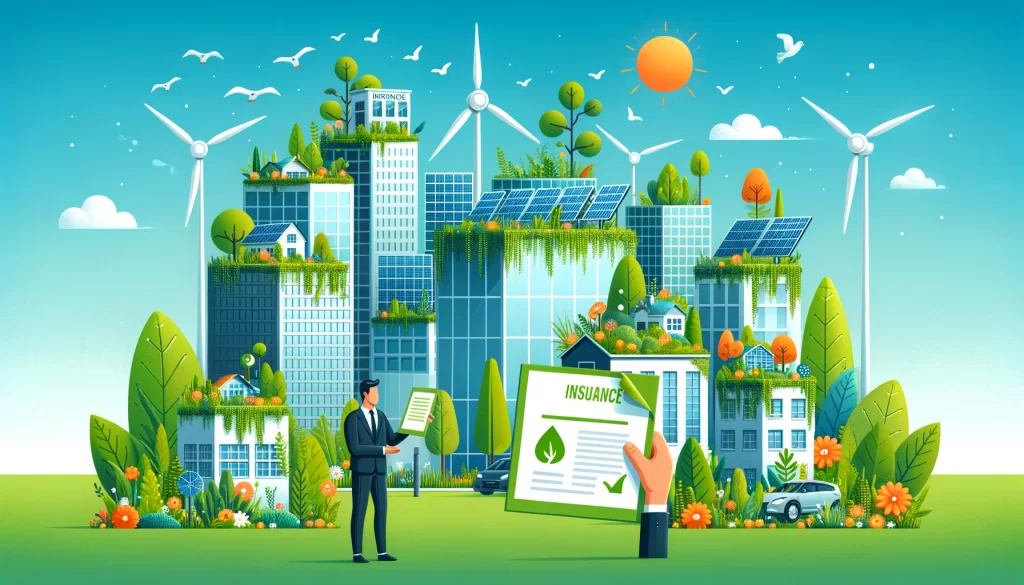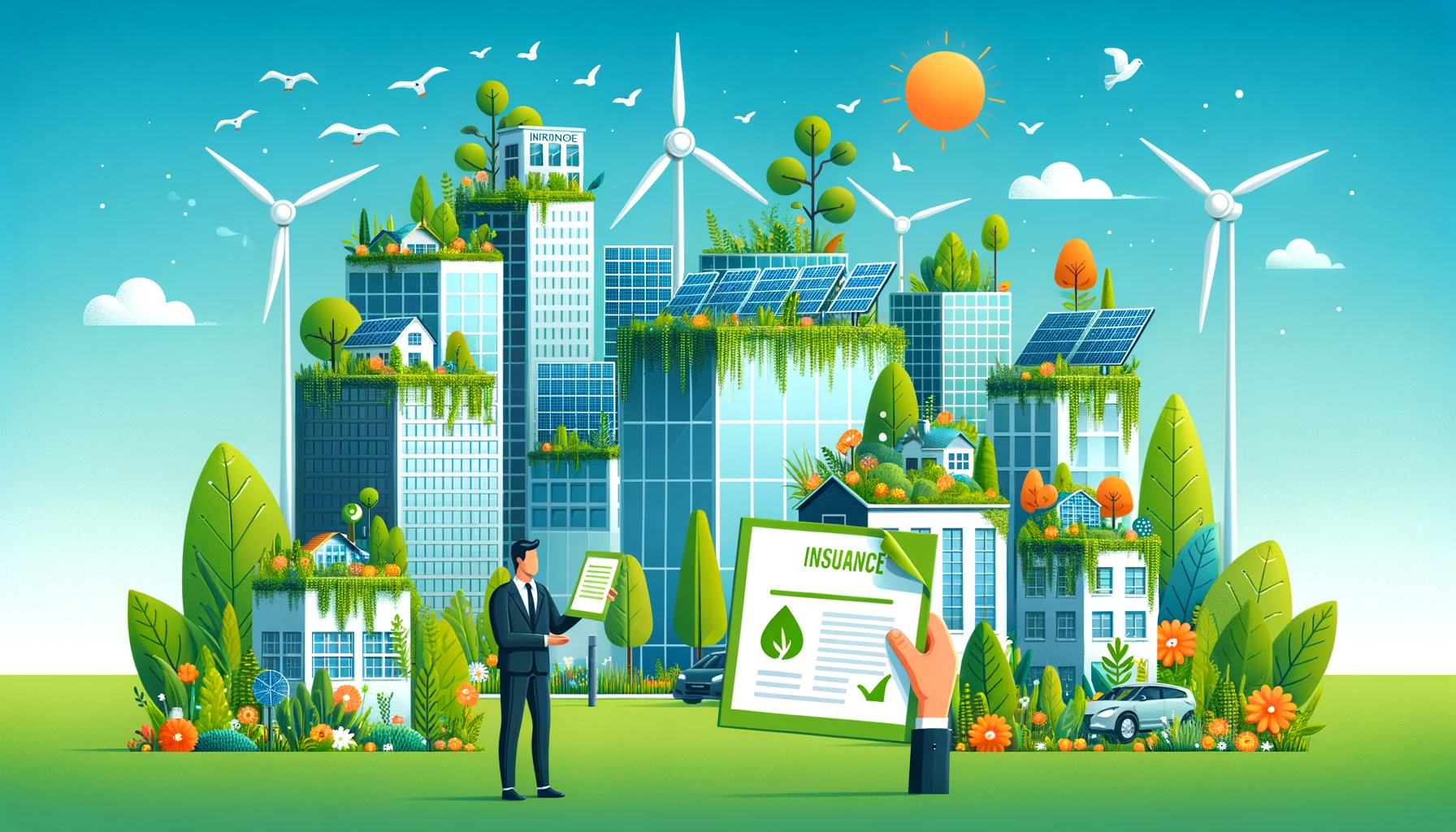In today’s world, where sustainability is becoming increasingly important, more people are looking for ways to reduce their environmental impact. One area that often gets overlooked is insurance. Yes, you heard that right—insurance can also be eco-friendly! Green insurance is a relatively new concept that aims to provide coverage while promoting environmentally responsible practices. In this comprehensive guide, we’ll explore what green insurance is, why it’s beneficial, and how you can incorporate it into your sustainable lifestyle.

What is Green Insurance?
Green insurance refers to insurance policies designed to support and encourage environmentally friendly practices. These policies often include incentives for policyholders who take steps to reduce their carbon footprint. For example, green insurance may offer discounts for driving hybrid or electric cars, using energy-efficient appliances, or implementing sustainable building practices. By choosing green insurance, you can protect yourself and your assets while also contributing to a healthier planet.
Types of Green Insurance Policies
1. Green Auto Insurance
One of the most popular forms of green insurance is green auto insurance. This type of policy provides coverage for hybrid and electric vehicles, often at a lower premium compared to traditional auto insurance. Additionally, green auto insurance may offer benefits such as coverage for charging station installation and discounts for participating in carpooling programs.
2. Green Home Insurance
Green home insurance policies are designed for homeowners who want to reduce their environmental impact. These policies may offer coverage for the installation of solar panels, energy-efficient windows, and other eco-friendly home improvements. Furthermore, green home insurance can provide benefits for using sustainable materials in home repairs and renovations.
3. Green Business Insurance
Businesses can also take advantage of green insurance through specialized policies that encourage sustainable practices. Green business insurance may offer coverage for environmentally friendly equipment and processes, as well as incentives for reducing waste and energy consumption. By adopting green insurance, businesses can demonstrate their commitment to sustainability and attract eco-conscious customers.
4. Green Travel Insurance
For those who love to travel, green travel insurance provides coverage with an eco-friendly twist. These policies often include options for carbon offset programs, which help to neutralize the environmental impact of your travels. Additionally, green travel insurance may offer benefits such as coverage for eco-friendly accommodations and sustainable travel practices.
Benefits of Green Insurance
1. Financial Savings
One of the primary benefits of green insurance is the potential for financial savings. Many green insurance policies offer discounts and incentives for adopting eco-friendly practices, which can lead to lower premiums and reduced costs over time. For example, drivers of hybrid and electric vehicles may receive lower rates on their auto insurance, while homeowners who invest in energy-efficient upgrades can save on their home insurance premiums.
2. Environmental Impact
By choosing green insurance, you are directly contributing to the protection of the environment. These policies encourage the use of sustainable practices and technologies, which can help reduce carbon emissions and promote a healthier planet. Whether it’s driving a fuel-efficient car, installing solar panels, or supporting eco-friendly businesses, your actions can make a significant difference.
3. Enhanced Coverage
Green insurance policies often provide enhanced coverage options that go beyond traditional insurance. For instance, green home insurance may cover the cost of rebuilding with sustainable materials after a loss, while green auto insurance might include roadside assistance for electric vehicles. These additional benefits can provide peace of mind and ensure that you are fully protected in an environmentally responsible way.
How to Choose the Right Green Insurance
When selecting a green insurance policy, it’s important to consider your specific needs and goals. Here are some tips to help you choose the right policy:
1. Research Providers
Not all insurance providers offer green insurance, so it’s essential to research and find companies that specialize in eco-friendly policies. Look for providers with a strong commitment to sustainability and positive customer reviews.
2. Compare Policies
Once you’ve identified potential providers, compare their green insurance policies to determine which one best meets your needs. Consider factors such as coverage options, discounts, and additional benefits. Don’t be afraid to ask questions and request more information to ensure you understand the policy details.
3. Evaluate Your Lifestyle
Think about how you can incorporate green insurance into your daily life. If you drive an electric vehicle, look for auto insurance policies that offer benefits for EV owners. If you’re planning to make energy-efficient upgrades to your home, seek out home insurance that covers these improvements. By aligning your insurance choices with your lifestyle, you can maximize the benefits of green insurance.
Conclusion
Green insurance is an innovative and impactful way to protect yourself and your assets while promoting sustainability. By choosing eco-friendly policies, you can enjoy financial savings, enhanced coverage, and the satisfaction of knowing you’re contributing to a healthier planet. Whether it’s auto, home, business, or travel insurance, there are green options available to suit your needs. Start researching today and take a step towards a more sustainable future with green insurance.
Frequently Asked Questions About Green Insurance
What is green insurance?
Green insurance refers to insurance policies that support environmentally friendly practices. These policies often include incentives for policyholders who take steps to reduce their carbon footprint, such as driving hybrid or electric cars, using energy-efficient appliances, or implementing sustainable building practices.
How can green insurance save me money?
Green insurance can save you money through discounts and incentives for adopting eco-friendly practices. For example, drivers of hybrid and electric vehicles may receive lower rates on their auto insurance, while homeowners who invest in energy-efficient upgrades can save on their home insurance premiums.
What types of green insurance policies are available?
There are several types of green insurance policies available, including green auto insurance, green home insurance, green business insurance, and green travel insurance. Each type of policy offers coverage with an eco-friendly focus, encouraging sustainable practices and technologies.
How do I choose the right green insurance policy?
To choose the right green insurance policy, research providers that specialize in eco-friendly policies, compare their offerings, and evaluate your lifestyle to determine which policy best meets your needs. Consider factors such as coverage options, discounts, and additional benefits.
Are there any drawbacks to green insurance?
While green insurance offers many benefits, it may not be available from all insurance providers, and some policies may have higher premiums due to the additional coverage options. It’s important to thoroughly research and compare policies to ensure you’re getting the best value for your needs.
Can businesses benefit from green insurance?
Yes, businesses can benefit from green insurance through specialized policies that encourage sustainable practices. Green business insurance may offer coverage for environmentally friendly equipment and processes, as well as incentives for reducing waste and energy consumption.
By understanding and incorporating green insurance into your life, you can make a positive impact on the environment while protecting yourself and your assets. Choose green insurance today and take a step towards a more sustainable future.

[…] insurance policies are crafted to provide financial coverage for repairs and replacements needed due to natural […]
[…] and exclusions for certain types of climate-related damages. For instance, many standard home insurance policies do not cover flood damage, which can be a significant risk in areas prone to heavy rainfall and […]